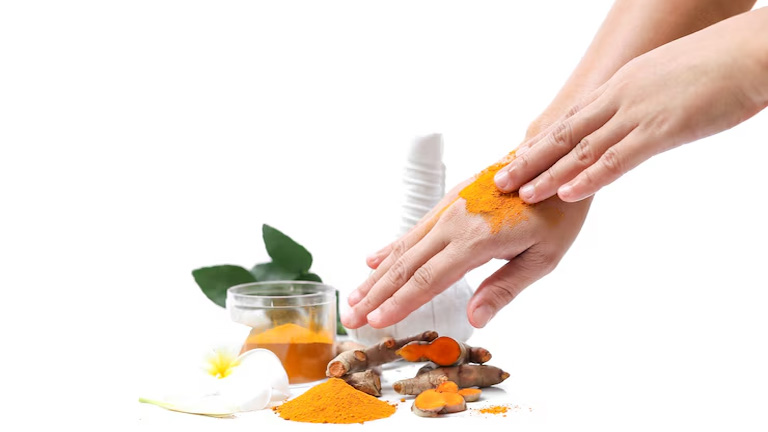Turmeric’s, often referred to as the “golden spice,” has been used for centuries in traditional medicine and cooking. Known for its vibrant yellow color and earthy flavor, turmeric is packed with powerful compounds that offer numerous health benefits. In this article, we will explore what turmeric is, its health benefits, its effects on sexual health, haldi powder benefits, and potential side effects of turmeric.
What Is Turmeric?
Turmeric, scientifically known as Curcuma longa, is a flowering plant from the ginger family. Its root is dried and ground into a fine powder, commonly used as a spice in Indian, Middle Eastern, and Southeast Asian cuisines. The active compound in Turmeric’s, curcumin, is responsible for most of its medicinal properties.
Turmeric’s has been a staple in Ayurvedic and Chinese medicine for treating inflammation, infections, digestive issues, and skin conditions. Modern research continues to uncover its potential in boosting immunity, improving heart health, and even fighting cancer.
Turmeric Benefits: Why You Should Include It in Your Diet
Turmeric offers a wide range of health benefits for both men and women. Here are some of the most notable advantages:
1. Powerful Anti-Inflammatory Effects
Chronic inflammation is linked to many diseases, including arthritis, heart disease, and cancer. Curcumin in Turmeric’s is a potent anti-inflammatory compound that helps reduce inflammation at the molecular level.
2. Boosts Immunity
Turmeric’s enhances immune function due to its antiviral, antibacterial, and antifungal properties. Regular consumption can help the body fight infections like colds and flu.
3. Supports Heart Health
Turmeric’s improves endothelial function, which helps regulate blood pressure and prevents blood clotting. Studies suggest it may reduce the risk of heart disease.
4. Aids Digestion & Gut Health
Turmeric stimulates bile production, helping with fat digestion and reducing bloating. It also supports a healthy gut microbiome, preventing conditions like IBS (Irritable Bowel Syndrome).
5. Enhances Brain Function & Reduces Risk of Neurodegenerative Diseases
Curcumin increases brain-derived neurotrophic factor (BDNF), a growth hormone that improves brain function and may delay Alzheimer’s and dementia.
6. Helps Manage Diabetes
Turmeric helps regulate blood sugar levels and improves insulin sensitivity, making it beneficial for people with type 2 diabetes.
7. Promotes Healthy Skin
Turmeric’s antioxidant and anti-inflammatory properties help treat acne, eczema, and psoriasis. It also brightens the skin and reduces signs of aging.
8. May Help Prevent Cancer
Research suggests that curcumin can suppress cancer cell growth and reduce tumor spread, particularly in breast, prostate, and colon cancers.
9. Supports Weight Loss
Turmeric’s boosts metabolism and helps in fat breakdown, aiding in natural weight management.
10. Improves Joint & Bone Health
Due to its anti-inflammatory effects, Turmeric’s is excellent for arthritis and joint pain relief. It also helps maintain bone density, reducing the risk of osteoporosis.
Turmeric Benefits Sexually: How It Boosts Libido & Performance
Turmeric is known to enhance sexual health in both men and women:
For Men:
-
Boosts Testosterone Levels: Curcumin may help increase testosterone production.
-
Improves Blood Circulation: Enhances erectile function and stamina.
-
Reduces Oxidative Stress: Protects sperm health and fertility.
For Women:
-
Balances Hormones: Helps regulate estrogen levels, improving libido.
-
Enhances Blood Flow: Increases arousal and sexual satisfaction.
-
Supports Reproductive Health: Reduces symptoms of PCOS and menstrual cramps.
Haldi Powder Benefits: Traditional Uses & Modern Applications
Haldi (the Hindi word for turmeric) powder is widely used in:
-
Cooking: Adds flavor and color to dishes like curries and soups.
-
Home Remedies: Used in golden milk (turmeric tea) for colds and immunity.
-
Skincare: Mixed with honey or yogurt for glowing skin.
-
Wound Healing: Applied topically to disinfect cuts and burns.
Is Turmeric Good for You? Science-Backed Evidence
Yes! Numerous studies confirm turmeric’s benefits:
-
Reduces inflammation (Journal of Medicinal Food).
-
Improves brain function (American Journal of Geriatric Psychiatry).
-
Lowers heart disease risk (Nutrition Research).
However, moderation is key, as excessive intake may cause side effects.
What Is Turmeric Good For? Everyday Uses
-
Turmeric’s Tea: Boosts immunity and digestion.
-
Turmeric’s Supplements: Convenient for daily intake.
-
Turmeric’s Soap: Treats acne and skin inflammation.
-
Turmeric’s Oil: Used in aromatherapy for pain relief.
10 Serious Side Effects of Turmeric
While turmeric is generally safe, excessive consumption can lead to:
-
Stomach Upset – May cause nausea or diarrhea.
-
Blood Thinning – Can interfere with anticoagulant medications.
-
Gallbladder Issues – May worsen gallstones.
-
Iron Deficiency – High doses can inhibit iron absorption.
-
Low Blood Pressure – Can cause dizziness in some people.
-
Kidney Stones – Due to oxalate content.
-
Allergic Reactions – Skin rashes in sensitive individuals.
-
Pregnancy Risks – May stimulate uterus contractions.
-
Liver Toxicity – Extremely high doses may harm the liver.
-
Hypoglycemia – Can lower blood sugar too much in diabetics.
Recommended Dosage:
-
Powder: 1-3 grams per day.
-
Supplements: 500-2,000 mg of curcumin daily.
Conclusion: Should You Take Turmeric Daily?
Turmeric’s is a powerful natural remedy with benefits ranging from anti-inflammatory effects to improved sexual health. Whether consumed as turmeric powder, tea, or supplements, it can significantly enhance overall well-being. However, always consult a doctor before taking high doses, especially if you have underlying health conditions.
By incorporating turmeric’s into your diet, you can harness its healing properties and enjoy a healthier, more vibrant life.
FAQs
Q: What does turmeric do for the body?
A: Turmeric’s reduces inflammation, boosts immunity, supports heart and brain health, and improves digestion.
Q: What is the best turmeric supplement?
A: Look for supplements with black pepper (piperine) to enhance absorption.
Q: Can turmeric help with weight loss?
A: Yes, it boosts metabolism and aids fat breakdown.
Q: Is fresh turmeric better than powder?
A: Fresh turmeric has higher antioxidant levels, but both forms are beneficial.
Q: Can turmeric interact with medications?
A: Yes, especially blood thinners and diabetes medications. Consult a doctor before use.
By understanding turmeric benefits and side effects, you can make an informed decision about adding this golden spice to your daily routine!


